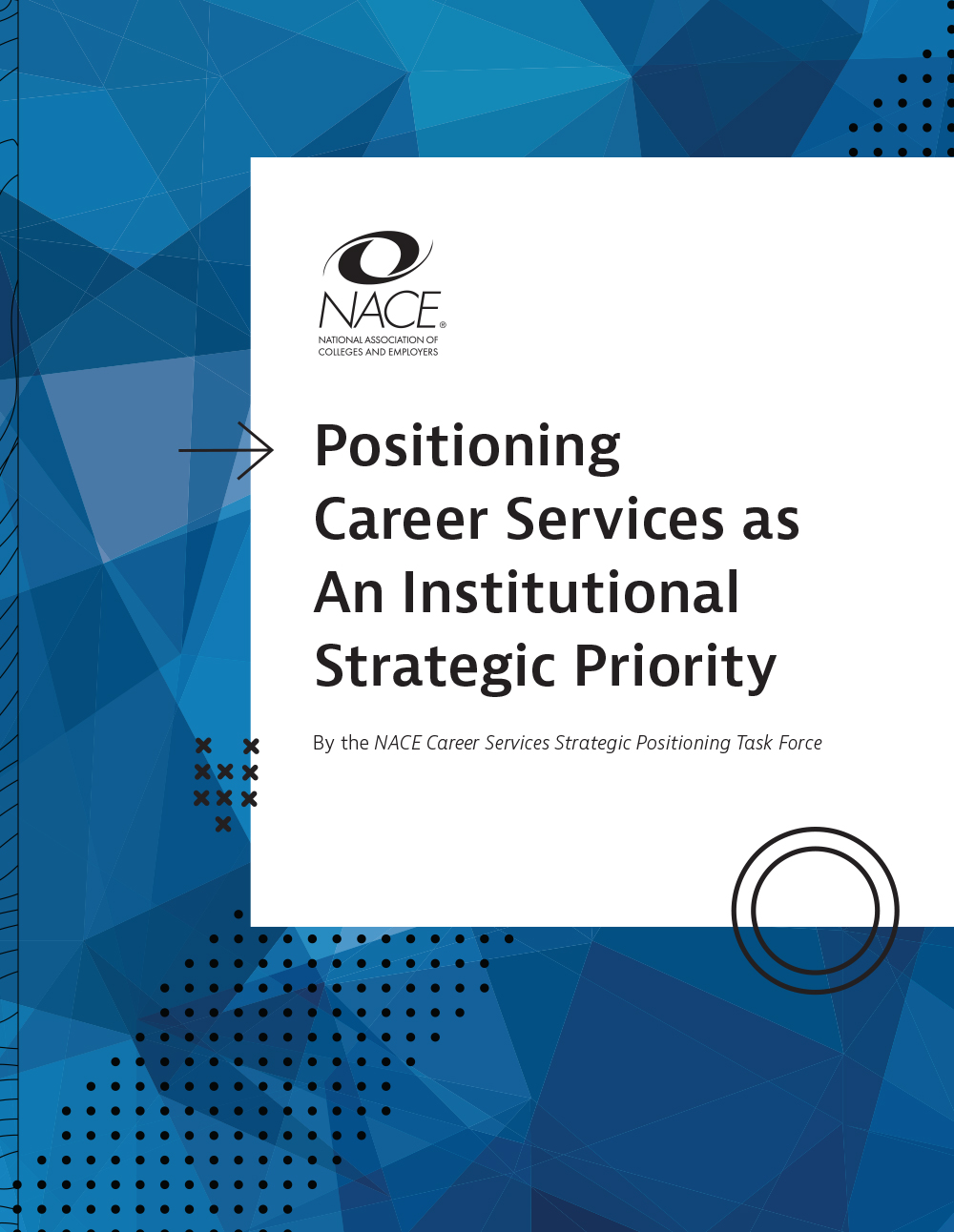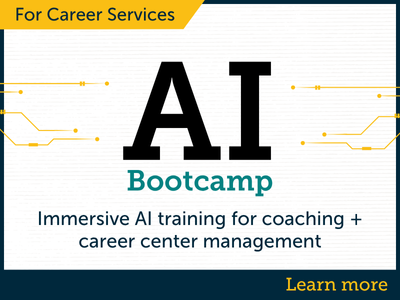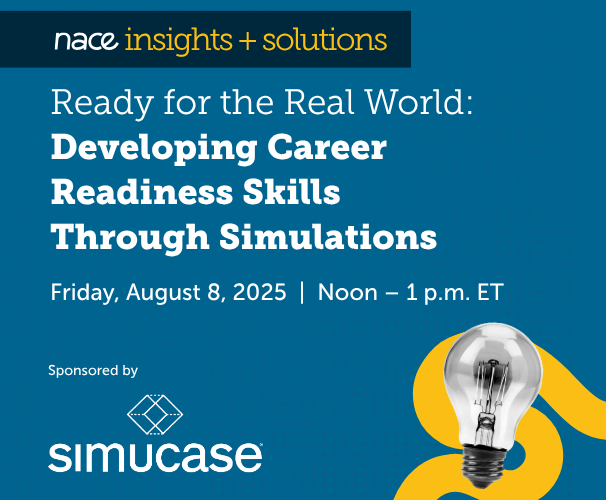During the pandemic in 2020, LaGuardia Community College—a public community college that is part of the City University of New York (CUNY) system—inaugurated a new president, who is an advocate for workforce development as well as for internships. In addition, the chancellor for CUNY established career services as one of his priorities.
Maximizing career services at the Long Island City, New York, institution required a shift in the career services office’s reporting structure.
“When I started in 2014, the office had been in student affairs for three years,” says Jessica Perez, LaGuardia’s director of the Center for Career & Professional Development (CCPD).

FREE DOWNLOAD
Explore the elevation of career services on campus through six case studies, plus a roadmap for repositioning, and recommendations for how to get endorsements for repositioning.DOWNLOAD NOW
“At that time, it was a great alignment for career services because we were able to re-establish ourself and rebuild relationships with faculty and advisement as we were under the advisement portfolio. We were also able to better connect with students because it was a direct referral as we all reported to the same dean. It allowed us to build rapport and help students.”
In March of 2022, the CCPD transitioned to Adult and Continuing Education (ACE).
“We already had these established relationships, so we are still working with student affairs and with academic affairs,” Perez points out.
“The move has opened the doors for us to take the lead on some of the internship programs from the foundation and develop more relationships with industry partners.”
Before the elevation, the CCPD reported to the dean of student success within student affairs. With the transition of the new president and the CUNY chancellor’s priorities, the CCPD is now a direct report to the vice president of ACE, who reports directly to the president.
“The vice president of ACE is a former career services director,” Perez notes.
“He knows the work that we do and the impact we have, and he understands the support that we need. We have been getting that as opposed to us getting lost in the shuffle with all the other student-facing offices when we were in student affairs.”
The elevation and change in reporting also enabled the college to centralize experiential learning, internships, and employment.
“The move was to better align career services,” Perez explains.
“Before, career services was very fragmented; we had many offices doing similar work for a different population. We were siloed. There's also a career services office in ACE for non-degree students. The president wants anyone who is doing career and workforce development to be under one division so that we could work more in unison and coordinate employer relations, student services, work with faculty, and more.”
For LaGuardia, a lot of money flows from the Perkins Grant for different initiatives at the college. Monies were available through grants to hire permanent positions as well as a work-based learning manager, which is a tax levy permanent position not connected to grants.
With the elevation, the move to centralize career services operations across the college is in progress. For example, conversations took place with the office of advancement for LaGuardia to offer stipend-based internships that are funded by The LaGuardia Foundation; the CCPD has been charged with overseeing these internships.
“We have launched the experiential learning program that has several programs under it, including CUNY-wide internship programs through which students are paid for a seven-week experience, so my office has expanded,” Perez says.
“We also have SOAR, in which 125 students receive a $2,000 stipend from our LaGuardia Foundation to take internships related to their majors.”
The sea change at LaGuardia Community College is happening in phases. One recent phase of the change was to secure faculty buy-in and active support. The goal is for career services staff to support faculty, not to take away experiential learning programs (such as clinicals), but to serve as the facilitator, to help support the preparation of students and the documentation of the placements.
Autonomy has always been a part of the culture for the CCPDD and the role of the director. With the elevation and spotlight on career services, more responsibilities have been added. With the elevation, Perez has a direct reporting line to the vice president and a “dotted line” to the dean of student success to keep that partnership and communication channel open.
“Reporting directly to the VP is extremely helpful,” Perez says.
“There's no middle person; I can go directly go to him and share the good and the not-so-good things, what our needs are, the gaps in the office, and more. I appreciate that I report to him directly because he's aware. When he's in a meeting, he knows exactly what's happening in career services, and he’s not getting it from a third party.
“In addition, our president is a strong advocate of career services, so he is always recommending us to faculty and others. In the past year, we have become a hot commodity on campus; we are very popular. More faculty are requesting in-class presentations. We are developing more and stronger employer partnerships and developing pipelines. Our new associate provost for career and industry partnership is always looking at the most popular industries for LaGuardia and connecting us with employers in those industries.”
Embedding career readiness into the curriculum is also part of the plans. Perez points to a CUNY-wide initiative called the AAS Redesign Project.
“I’m one of the representatives, along with one of LaGuardia’s academic deans and our provost,” she says.
“We're focusing on how to better market AAS programs and better design them so, in part, we can better prepare students in these majors to go into the workforce. We are embedding career readiness into the curriculum for this and other programs. There are things happening at the central level that are now being funneled to the campuses that involve embedding these skills and having more conversations with industry professionals to update and strengthen our academic programs.”
Another outcome of the shift: Perez feels like she has become a better director.
“Because career services is more high level now, I'm having many more high-level conversations with different administrators and department heads, and I'm better able to guide my team,” she explains.
“I have grown personally, but so has our staff. They see the positive development. We now have support and attention throughout campus. We can really do what we’ve always said we’d like to do. We are heading in the right direction. We're building more industry partnerships. We are getting support in providing students with different experiential learning opportunities. Being in ACE and having more access to resources is definitely the best alignment for career services right now at LaGuardia.”







